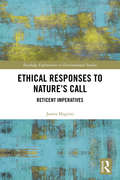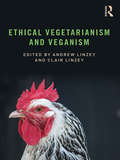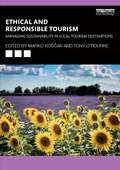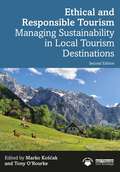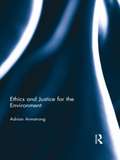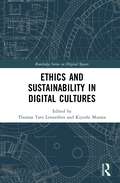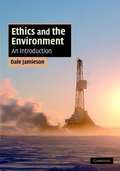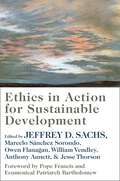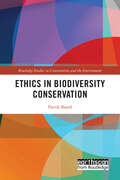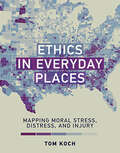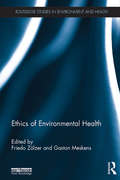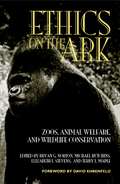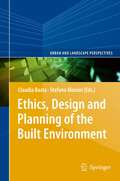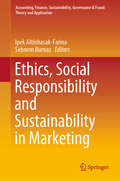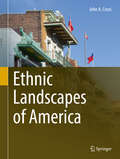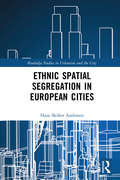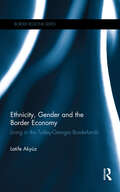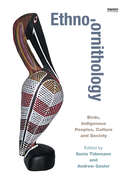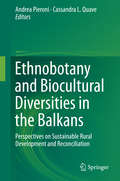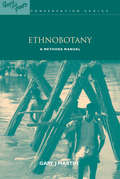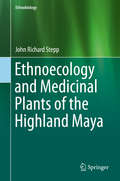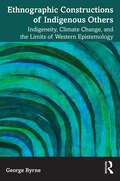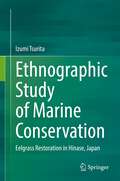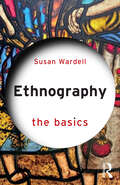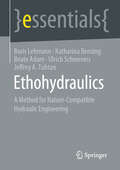- Table View
- List View
Ethical Responses to Nature’s Call: Reticent Imperatives (Routledge Explorations in Environmental Studies)
by James MagriniArguing for a renewed view of objects and nature, Ethical Responses to Nature’s Call considers how it is possible to understand our ethical duties - in the form of ethical intuitionalism - to nature and the planet by listening to and releasing ourselves over to the call or address of nature. Blending several strands of philosophical thought, such as Graham Harman’s Object-Oriented Ontology, W. D. Ross’s prima fathics, Alphonso Lingis’s phenomenological ethics traceable to The Imperative, and Michael Bonnett’s ecophilosophy, this book offers a unique rejoinder to the problems and issues that continue to haunt humans’ relationship to nature. The origins of such problems and issues largely remain obscured from view due to the oppressive influence of the "Cultural Framework" which gives form and structure to the ways we understand, discourse on, and comport ourselves in relation to the natural world. Through understanding this "Cultural Framework" we also come to know the responses we continue to offer in answer to nature’s call and address, and are then in a position to analyze and assess those responses in terms of their potential ethical weight. Such a phenomenon is made possible through the descriptive-and-interpretive method of eco-phenomenology. This renewed vision of the human-and-nature provides direction for our interaction with and behavior toward nature in such a way that the ethical insight offers a diagnosis and provides a potentially compelling prescriptive for environmental ills.
Ethical Vegetarianism and Veganism
by Andrew Linzey Clair LinzeyThe protest against meat eating may turn out to be one of the most significant movements of our age. In terms of our relations with animals, it is difficult to think of a more urgent moral problem than the fate of billions of animals killed every year for human consumption. This book argues that vegetarians and vegans are not only protestors, but also moral pioneers. It provides 25 chapters which stimulate further thought, exchange, and reflection on the morality of eating meat. A rich array of philosophical, religious, historical, cultural, and practical approaches challenge our assumptions about animals and how we should relate to them. This book provides global perspectives with insights from 11 countries: US, UK, Germany, France, Belgium, Israel, Austria, the Netherlands, Canada, South Africa, and Sweden. Focusing on food consumption practices, it critically foregrounds and unpacks key ethical rationales that underpin vegetarian and vegan lifestyles. It invites us to revisit our relations with animals as food, and as subjects of exploitation, suggesting that there are substantial moral, economic, and environmental reasons for changing our habits. This timely contribution, edited by two of the leading experts within the field, offers a rich array of interdisciplinary insights on what ethical vegetarianism and veganism means. It will be of great interest to those studying and researching in the fields of animal geography and animal-studies, sociology, food studies and consumption, environmental studies, and cultural studies. This book will be of great appeal to animal protectionists, environmentalists, and humanitarians.
Ethical and Responsible Tourism: Managing Sustainability in Local Tourism Destinations
by Tony O'Rourke Marko Kos AkEthical and Responsible Tourism explains the methods and practices used to manage the environmental impact of tourism on local communities and destinations. The three core themes of the book – destination management, environmental and social aspects of ethical sustainable development and business impacts – are discussed across both topic and case study chapters, alongside explanatory editorial analysis with all chapters clearly signposted and interlinked. The case studies address specific and practical examples from a global range of examples including sites in Australia, Central America, Europe Union countries, Japan, North America and South America. Used as a core textbook, the linking of theory in the topic chapters, and practice gained through case studies, alongside further reading and editorial commentary, Ethical and Responsible Tourism provides a detailed and comprehensive learning experience. Specific case studies can be used as standalone examples as part of a case teaching approach, and the editorial and discussion elements are designed to be suitable for those simply seeking a concise overview, such as tourism professionals or potential investors in sustainable tourism projects. This book will be essential reading for students, researchers and practitioners of tourism, environmental and sustainability studies.
Ethical and Responsible Tourism: Managing Sustainability in Local Tourism Destinations
by Marko KoščakEthical and Responsible Tourism explains the methods and practices used to manage the environmental impact of tourism on local communities and destinations. This new edition takes into account recent global events such as the Covid-19 health crisis, the impacts of the war in Ukraine on tourism in neighbouring regions and the consequences of the energy and cost of living crisis. The three core themes of the book – destination management, environmental and social aspects of ethical sustainable development and business impacts – are discussed across both topic and case study chapters, alongside explanatory editorial analysis with all chapters clearly signposted and interlinked. The case studies address specific and practical examples from a global range of examples including sites in Australasia, Central America, Europe, Asia, North America and South America. In this new edition, further case studies are included from the USA and Japan, as well as new examples from Brazil, Croatia and Malta. Used as a core textbook, the linking of theory in the topic chapters, and practice gained through case studies, alongside further reading and editorial commentary, Ethical and Responsible Tourism provides a detailed and comprehensive learning experience. Specific case studies can be used as standalone examples as part of a case teaching approach, and the editorial and discussion elements are designed to be suitable for those simply seeking a concise overview, such as tourism professionals or potential investors in sustainable tourism projects. This revised edition continues to be essential reading for students, researchers and practitioners of tourism, environmental and sustainability studies.
Ethics and Justice for the Environment
by Adrian ArmstrongExamining the issues of ethics and justice as they apply to the environment, this book starts from the observation that the parallel expositions of environmental ethics and environmental justice appear to have few points of contact. Environmental justice is highly politicized and concerned with human access to the environment and the unequal exposure to environmental pollution. It grew out of the US civil rights movement, the liberal tradition of rights, and Rawls’ description of justice as fairness. It is thus almost exclusively anthropocentric, and does not address the question of justice for the environment. By contrast environmental ethical studies are a wide ranging collection of approaches that are concerned with caring for the earth, and the justifications for it, but rarely consider the issue of justice. Although the two movements do not come together at the theoretical level, they do so at the grass roots activist level. An essential component of this study is thus to consider both the issues of grass roots action, and the application of the methods to actual case studies.This book finds a common ground between these two strands and so to develop a unified statement of justice for the environment that includes the insights of both approaches, particularly based on the 'capability ideas of justice' developed by Martha Nussbaum.
Ethics and Sustainability in Digital Cultures (Routledge Series on Digital Spaces)
by Thomas Taro LennerforsDigital technologies, now ubiquitous around the world, can promote positive values, as well as support those that are less socially acceptable. To better understand such technologies’ impact on ethics and sustainability, this book situates digital technologies within a cultural context, arguing that the technology is received differently in different cultural contexts. The book contains chapters on state-of-the-art digital technologies such as artificial intelligence from various countries including Japan and Sweden to highlight the multifarious ways in how ethical and sustainability issues are being manifested in certain cultural contexts. The book contributes to furthering understandings on the similarities and differences between digital technology implementations in different cultures, promoting a cross-cultural dialogue on desired values and how they are promoted or downplayed by such technologies. The book is divided into two parts: the former focuses on how individuals relate to new digital technologies, and the latter focuses on those who develop digital technologies. The book targets scholars, businesspeople and policymakers interested in the interconnection between digital technologies, ethics and sustainability from various cultural viewpoints. It provides new case studies on a range of digital technologies and discussions about digital technology implementations in cultural contexts.
Ethics and the Environment: An Introduction
by Dale JamiesonThis book is an introduction to the philosophical issues involved in this important question, focussing primarily on ethics but also encompassing questions in aesthetics and political philosophy. Topics discussed include the environment as an ethical question, human morality, meta-ethics, normative ethics, humans and other animals, the value of nature, and nature's future.
Ethics in Action for Sustainable Development
by Sachs, Jeffrey D.; Sorondo, Marcelo Sánchez; Flanagan, Owen; Vendley, William; Annett, Anthony; Thorson, JesseThe Sustainable Development Goals, adopted by the United Nations in 2015, comprise an ambitious and sweeping agenda that unites economic, social, and environmental aims. What resources do the world’s religious and secular traditions offer in support of these objectives? Which principles do these traditions hold in common, and how can these shared values help advance global goals?This book presents an in-depth and deeply engaged conversation among interfaith religious leaders and interdisciplinary scholars and practitioners in pursuit of an ethical consensus that could ground sustainable development efforts. Drawing on more than two years of close-knit discussions convened by Jeffrey D. Sachs and Marcelo Sánchez Sorondo, it offers an extensive and inclusive vision of how to promote human flourishing. The book features theological, philosophical, and ethical deliberations of great diversity and depth on the challenges of sustainable development, addressing questions of poverty, environmental justice, peace, conflict, and the future of work. It includes consensus statements on the moral imperatives of sustainable development, introductions to seven major religious traditions and their conceptions of the common good, and thematic reflections. Wide-ranging and urgent, this book represents a major contribution to interreligious dialogue and to the articulation of a shared global ethics.The book features a foreword by Pope Francis and Ecumenical Patriarch Bartholomew.
Ethics in Biodiversity Conservation (Routledge Studies in Conservation and the Environment)
by Patrik BaardThis book examines the role of ethics and philosophy in biodiversity conservation. The objective of this book is two-fold: on the one hand it offers a detailed and systematic account of central normative concepts often used, but rarely explicated nor justified, within conservation biology. Such concepts include ‘values’ (both intrinsic, instrumental, and, more recently, relational), ‘rights’, and ‘duties’. The second objective is to emphasize to environmental philosophers and applied ethicists the many interesting decision-making challenges of biodiversity conservation. The book argues that a nuanced account of instrumental values provides a powerful tool for reasoning about the values of biodiversity. It also scrutinizes relational values, the concept of rights of nature, and risk, and show how moral philosophy proves indispensable for these concepts. Consequently, it engages with recent suggestions on normative aspects of biodiversity conservation, and show the need for moral philosophy in biodiversity conservation. The overriding aim of this book is to provide conservation biologists and policy-makers with a systematic overview of concepts and assessments of the reasons for reaching prescriptive conclusions about biodiversity conservation. This will prove instrumental in clarifying the role of applied ethics and a refined understanding of the tools it can provide. This title will be of interest to students and scholars of conservation biology, conservation policy, environmental ethics and environmental philosophy.
Ethics in Everyday Places: Mapping Moral Stress, Distress, and Injury (Basic Bioethics)
by Tom KochAn exploration of moral stress, distress, and injuries inherent in modern society through the maps that pervade academic and public communications worlds.In Ethics in Everyday Places, ethicist and geographer Tom Koch considers what happens when, as he puts it, “you do everything right but know you've done something wrong." The resulting moral stress and injury, he argues, are pervasive in modern Western society. Koch makes his argument "from the ground up," from the perspective of average persons, and through a revealing series of maps in which issues of ethics and morality are embedded.The book begins with a general grounding in both moral stress and mapping as a means of investigation. The author then examines the ethical dilemmas of mapmakers and others in the popular media and the sciences, including graphic artists, journalists, researchers, and social scientists. Koch expands from the particular to the general, from mapmaker and journalist to the readers of maps and news. He explores the moral stress and injury in educational funding, poverty, and income inequality ("Why aren't we angry that one in eight fellow citizens lives in federally certified poverty?"), transportation modeling (seen in the iconic map of the London transit system and the hidden realities of exclusion), and U.S. graft organ transplantation.This uniquely interdisciplinary work rewrites our understanding of the nature of moral stress, distress and injury, and ethics in modern life. Written accessibly and engagingly, it transforms how we think of ethics—personal and professional—amid the often conflicting moral injunctions across modern society.Copublished with Esri Press
Ethics of Environmental Health (Routledge Studies in Environment and Health)
by Friedo Zölzer Gaston MeskensEnvironmental health encompasses the assessment and control of those environmental factors that can potentially affect human health, such as radiation, toxic chemicals and other hazardous agents. It is often assumed that the assessment part is just a matter of scientific research, and the control part a matter of implementing standards which unambiguously follow from that research. But it is less commonly understood that environmental health also requires addressing questions of an ethical nature. How can we determine the "acceptable" risk level for the general population or for certain groups? How should we deal with uneven distributions of risks and benefits? How do we communicate about risks with the stakeholders? This multidisciplinary collection brings together a number of leading researchers and scholars in order to generate discussion surrounding these key questions, and to bring the ethical implications of science and technology to the forefront of critical thought. Providing a broad overview of the Ethics of Environmental Health, its philosophical foundations and practical applications, this book offers a significant contribution to ongoing discussions in sustainable development and will be of interest to scholars and practitioners of Environmental Health, urban studies and healthcare.
Ethics on the Ark: Zoos, Animal Welfare, and Wildlife Conservation
by Terry Maple Elizabeth Stevens Michael Hutchins Bryan G. NortonEthics on the Ark presents a passionate, multivocal discussion--among zoo professionals, activists, conservation biologists, and philosophers--about the future of zoos and aquariums, the treatment of animals in captivity, and the question of whether the individual, the species, or the ecosystem is the most important focus in conservation efforts. Contributors represent all sides of the issues. Moving from the fundamental to the practical, from biodiversity to population regulation, from animal research to captive breeding, Ethics on the Ark represents an important gathering of the many fervent and contentious viewpoints shaping the wildlife conservation debate.From the Trade Paperback edition.
Ethics, Design and Planning of the Built Environment
by Stefano Moroni Claudia BastaThe book proposes a set of original contributions in research areas shared by planning theory, architectural research, design and ethical inquiry. The contributors gathered in 2010 at the Ethics of the Built Environment seminar organized by the editors at Delft University of Technology. Both prominent and emerging scholars presented their researches in the areas of aesthetics, technological risks, planning theory and architecture. The scope of the seminar was highlighting shared lines of ethical inquiry among the themes discussed, in order to identify perspectives of innovative interdisciplinary research. After the seminar all seminar participants have elaborated their proposed contributions. Some of the most prominent international authors in the field were subsequently invited to join in with this inquiry. Claudia Basta teaches "Network Infrastructures and Mobility" at Wageningen University. Between 2009 and 2011 she worked as Coordinator of the 3TU Centre of Excellence for Ethics and Technology of Delft University, where she completed her post-doc research on the shared areas of investigation between risk theories, planning theories and ethical inquiry. Her main research interests concern the matter of assessing and governing technological risks in relation to sustainable land use planning. She wrote a number of journal articles and contributions to collective books on these themes. Stefano Moroni teaches "Land use ethics and the law" at Milan Politecnico. His main research interests concern planning theory and ethics. He is the author of a number of books and journal articles. Recent publications (as co-author): Contractual Communities in the Self-Organizing City (Springer 2012).
Ethics, Social Responsibility and Sustainability in Marketing (Accounting, Finance, Sustainability, Governance & Fraud: Theory and Application)
by Ipek Altinbasak-Farina Sebnem BurnazThis book addresses the rising concept of 21st century societal marketing which entails that marketers should fulfill the needs of their target group in ways that enhance the well-being of a society as a whole. In the past, social responsibility and corporate ethics may not have been the key elements of corporate and business strategy. However, in the last decade the picture has changed dramatically. Consumers are more concerned about ethical issues and the effects of business activities on the environment and the society. The impact and importance of ethical consumerism is escalating. The consumers are more attentive and expect companies promote their ethical credentials in order to make them more accountable of their actions. This book also reveals how companies should realize that corporate social responsibility (CSR) is not an illustration of corporate altruism but a source of opportunity, and competitive advantage. Finding and following social initiatives as a part of the key business model is proved to be one of the competitive strengths in many instances. This book covers different issues related to ethics, social responsibility and sustainability in marketing and presents different cases and applications from different countries. Together with the best practices, each case and research is expected to shed light on how to improve the role of marketing in helping to the development and well-being of the society.
Ethnic Landscapes of America
by John A. CrossThis volume provides a comprehensive catalog of how various ethnic groups in the United States of America have differently shaped their cultural landscape. Author John Cross links an overview of the spatial distributions of many of the ethnic populations of the United States with highly detailed discussions of specific local cultural landscapes associated with various ethnic groups. This book provides coverage of several ethnic groups that were omitted from previous literature, including Italian-Americans, Chinese-Americans, Japanese-Americans, and Arab-Americans, plus several smaller European ethnic populations. The book is organized to provide an overview of each of the substantive ethnic landscapes in the United States. Between its introduction and conclusion, which looks towards the future, the chapters on the various ethnic landscapes are arranged roughly in chronological order, such that the timing of the earliest significant surviving landscape contribution determines the order the groups will be viewed. Within each chapter the contemporary and historical spatial distribution of the ethnic groups are described, the historical geography of the group’s settlement is reviewed, and the salient aspects of material culture that characterize or distinguish the group’s ethnic landscape are discussed. Ethnics Landscapes of America is designed for use in the classroom as a textbook or as a reader in a North American regional course or a cultural geography course. This volume also can function as a detailed summary reference that should be of interest to geographers, historians, ethnic scholars, other social scientists, and the educated public who wish to understand the visible elements of material culture that various ethnic populations have created on the landscape.
Ethnic Spatial Segregation in European Cities (Routledge Studies in Urbanism and the City)
by Hans Skifter AndersenThis book provides the first in depth interpretation of how to understand the causes of ethnic residential segregation across Western European countries and the USA. In many countries, ethnic minorities have obtained low quality housing and may be concentrated in certain parts of cities. This book asks to what extent ethnic segregation can be assigned to special preferences for housing and neighbourhoods among ethnic minorities. Is it the behaviour of the native majority, or is it a result of housing and urban policies? Ethnic segregation differs greatly across European countries and cities. Chapters discuss the extent to which these differences can be explained by welfare state systems, levels of immigration and the ethnic composition of minorities. The book also considers the impact of housing policy and the spatial structure of urban housing markets created by urban planning and policies. This book will appeal to teachers, students and researchers working with segregation, urban sociology and geography. It will also be valuable to civil servants in central and local governments who are working with measures to combat ethnic segregation and its consequences.
Ethnicity, Gender and the Border Economy: Living in the Turkey-Georgia Borderlands (Border Regions Series)
by Latife AkyüzFor whom and why are borders drawn? What are the symbolic projections of these physical realities? And what are the symbolic projections of these physical realities? Constituted by experience and memory, borders shape a "border image" in the minds and social memory of people beyond the lines of the state. In the case of the Turkey-Georgia border, the image of the border has often been constructed as an economic reality that creates "conditional permeabilities" rather than political emphases. This book puts forward the argument that participation in this economic life reshapes the relationship between the ethnic groups who live in the borderland as well as gender relations. By drawing on detailed ethnographic research at the Turkey-Georgia border, life at the border is explored in terms of family relations, work life, and intra- and inter-ethnic group relations. Using an intersectional approach, the book charts the perceptions and representations of how different ethnic and gendered groups experience interactions among themselves, with each other, and with the changing economic context. This book offers a rich, empirically based account of the intersectional and multidimensional forms of economic activity in border regions. It will be of interest to students, researchers, and policy makers alike working in geography, economics, ethnic studies, gender studies, international relations, and political studies.
Ethno-ornithology: Birds, Indigenous Peoples, Culture and Society
by Andrew Gosler Sonia TidemannIndigenous knowledge that embraces ornithology takes in whole social dimensions that are inter-linked with environmental ethos, conservation and management for sustainability. In contrast, western approaches have tended to reduce knowledge to elemental and material references. This book looks at the significance of indigenous knowledge of birds and their cultural significance, and how these can assist in framing research methods of western scientists working in related areas. As well as its knowledge base, this book provides practical advice for professionals in conservation and anthropology by demonstrating the relationship between mutual respect, local participation and the building of partnerships for the resolution of joint problems. It identifies techniques that can be transferred to different regions, environments and collections, as well as practices suitable for investigation, adaptation and improvement of knowledge exchange and collection in ornithology. The authors take anthropologists and biologists who have been trained in, and largely continue to practise from, a western reductionist approach, along another path - one that presents ornithological knowledge from alternative perspectives, which can enrich the more common approaches to ecological and other studies as well as plans of management for conservation.
Ethnobotany and Biocultural Diversities in the Balkans
by Andrea Pieroni Cassandra L. QuaveThis volume addresses recent and ongoing ethnobotanical studies in the Balkans. The book focuses on elaborating the relevance of such studies for future initiatives in this region, both in terms of sustainable and peaceful (trans-regional, trans-cultural) rural development. A multi-disciplinary viewpoint is utilized, with an incorporation of historical, ethnographic, linguistic, biological, nutritional and medical perspectives. The book is also authored by recognized scholars, who in the last decade have extensively researched the Balkan traditional knowledge systems as they pertain to perceptions of the natural world and especially plants. Ethnobotany and Biocultural Diversities in the Balkans is the first ethnobotany book on one of the most biologically and culturally diverse regions of the world and is a valuable resource for both scholars and students interested in the field of ethnobotany.
Ethnobotany: A Methods Manual (People and Plants International Conservation)
by Gary J. MartinEthnobotany, the study of the classification, use and management of plants by people, draws on a range of disciplines, including natural and social sciences, to show how conservation of plants and of local knowledge about them can be achieved. Ethnobotany is critical to the growing importance of developing new crops and products such as drugs from traditional plants. This book is the basic introduction to the field, showing how botany, anthropology, ecology, economics and linguistics are all employed in the techniques and methods involved. It explains data collection and hypothesis testing and provides practical ideas on fieldwork ethics and the application of results to conservation and community development. Case studies illustrate the explanations, demonstrating the importance of collaboration in achieving results. Published with WWF, UNESCO and Royal Botanic Gardens Kew.
Ethnoecology and Medicinal Plants of the Highland Maya (Ethnobiology Ser.)
by John Richard SteppPlants play a central role in human existence. Medicinal plants, in particular, have allowed for the continued survival of the human species. This book, based on over a decade of research in Southern Mexico with the Highland Maya, explores the relationship between medicinal plants, traditional ecological knowledge and the environment. The biodiversity of the region remains among the highest in the world, comprising more than 9000 plant species. Over 1600 employed for medicinal uses and knowledge for approximately 600 species is widespread. Medicinal plants play an overwhelmingly primary role in the daily health care of the Highland Maya. Three principal objectives are addressed: 1) identifying which medicinal plants are used; 2) determining the role of environmental variation on use and selection of medicinal plants; and 3) identifying which habitats are preferred for medicinal plant procurement. Findings demonstrate the overwhelming importance of human modified environments for medicinal plants. Explanations are presented from human ecology and biochemical ecology. Implications for conservation, health and the environment are discussed.
Ethnographic Constructions of Indigenous Others: Indigeneity, Climate Change, and the Limits of Western Epistemology
by George ByrneThis book examines the ways in which indigeneity interacts with climate change politics at multiple levels and at the same time offers a self-critical reflection on the role of ethnographic research (and researchers) in this process. Through a multi-sited ethnography, it shows how indigeneity and climate change mitigation are at this point so intensely intertwined that one cannot be clearly understood without considering the other. While indigenous identities have been (re)defined in relation to climate change, it argues that Indigenous Peoples continue to subvert pervasive notions of the nature/culture dichotomy and disrupt our understanding of what it means to be human in relation to nature. It encourages students and researchers in anthropology, international development, and other related fields to engage in more meaningful reflection on the epistemic shortcomings of “the West”, including in our own research, and to acknowledge the ongoing role of power, coloniality, extractivism, and whiteness in climate change discourses.
Ethnographic Study of Marine Conservation: Eelgrass Restoration in Hinase, Japan
by Izumi TsuritaThis book explores the nature of marine conservation based on the case study of Hinase, a fishing village in Okayama, Japan. It focuses on the fishers’ self-motivated eelgrass restoration activity which has been continued for more than 30 years. This activity in Hinase recently attracted international attention as a case under the name “Satoumi” and “Marine Protected Areas” in several governmental reports, but detailed information, such as the historical background and social structure of Hinase, has not yet been analyzed. This book, therefore, fulfills this gap by providing its ethnographic information. In addition, this book offers some points for critical thinking by concluding that marine conservation activities cannot always be evaluated or arranged under the standardized approach with limited time and space. This viewpoint reaffirms the importance of local initiative and highlights the value of qualitative research to seek the way forward for promising marine conservation. This book is suitable for an academic audience in the field of social sciences, such as applied anthropology, as well as ecologists, government officials, environmentalists, and citizens who are interested or engaged in environmental issues or natural resource management.
Ethnography: The Basics (The Basics)
by Susan WardellEthnography: The Basics introduces a broad and beginner audience to ethnography as a research methodology with diverse applications. By using everyday language and developing a warm and inclusive tone, the book provides an accessible entry point to the topic.It offers a picture of the practice of ethnography that is both human and humane, tackling some of the practical barriers, ethical complexities, and lived experiences in an honest and straightforward way. Organised into eight chapters, the book provides a comprehensive overview of the unique purpose, value, and scope of ethnography, as well as a practical guide as to what the practice of ethnographic research involves, such as steps for designing research, gathering data, and analysing and presenting findings.Without relying on assumed familiarity with or interest in discipline-specific histories and frameworks, Ethnography: The Basics combines clear structure, plain language, and thoughtfully selected examples and stories to welcome students into this interesting and valuable subject. The book will also be of great interest to academics and professionals who wish to supplement their ethnographic knowledge.
Ethohydraulics: A Method for Nature-Compatible Hydraulic Engineering (essentials)
by Beate Adam Boris Lehmann Ulrich Schwevers Katharina Bensing Jeffrey A. TuhtanEthohydraulics is the transdiscipline linking behavioural science (ethology) and flow behaviour (hydraulics). Ethohydraulic studies provide repeatable and scalable insights into the reactive behaviour of aquatic animals. The findings can be used to derive limits and guidelines as well as design specifications for the planning of hydraulic engineering facilities. In this essential book, the authors provide an overview of the fundamentals and methodological approaches of ethohydraulic investigations. In addition to real-world case studies, current developments and future advances are provided.This Springer essential is a translation of the original German 1ststedition essentials,Ethohydraulik by Boris Lehmann, published by Springer-Verlag GmbH Germany, part of Springer Nature in 2021. The translation was done with the help of artificial intelligence (machine translation by the service DeepL.com). A subsequent human revision was done primarily in terms of content, so that the book will read stylistically differently from a conventional translation. Springer Nature works continuously to further the development of tools for the production of books and on the related technologies to support the authors.
